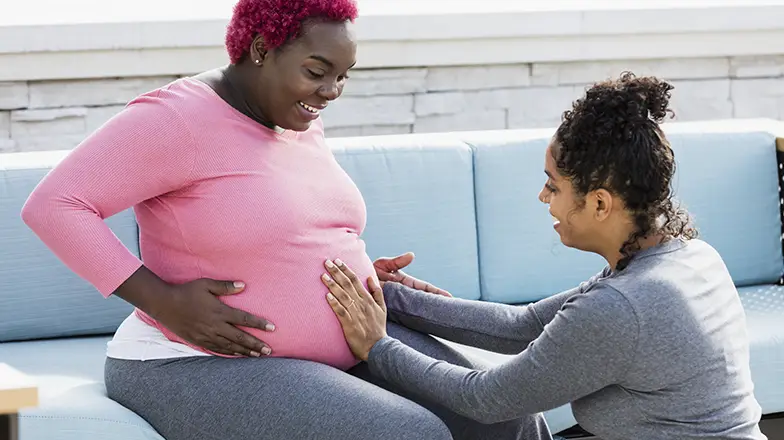Combating the Black maternal health crisis: The vital role of doulas

Black maternal morbidity and mortality rates in the United States have reached alarming levels, revealing a profound and systemic disparity in health care outcomes. Nationally, Black women are two to three times more likely to die from pregnancy-related complications than white women, according to the Centers for Disease Control and Prevention.
In St. Louis, the crisis hits home particularly hard. Missouri ranks in the bottom half (43rd) of states for pregnancy-related mortality. Black women are four times more likely to die of a pregnancy-related cause than white women. Additionally, women in rural areas are at a 24% higher risk for severe maternal morbidity and mortality.
While there are many factors contributing to this epidemic and just as many solutions needed, one powerful tool has been critical in changing outcomes—the support and advocacy provided by doulas, especially for Black mothers.
A doula is a trained professional who provides continuous physical, emotional and informational support to their client before, during and after childbirth. They support many types of families and focus on physical and emotional well-being, informed decision-making and empowering individuals to advocate for their own health care.
“Doulas have a very unique role in birth equity and addressing maternal health disparities. They are one of a few things that move the needle,” said LaShanda Jackson, women’s health nurse educator and outreach coordinator for Barnes-Jewish Hospital in St. Louis, part of BJC HealthCare.
For families delivering in a hospital where they don’t have a lot of experience or trusted relationships, Jackson said, their doula is a safe person to help them navigate the system of care.
Doulas play a critical role in addressing biases that still can be present in today’s health care environment. When a care team doesn’t have similar lived experiences as some of the people they serve, it can result in the disenfranchisement of underrepresented communities such as Black women.
To help address the disparate outcomes during pregnancy and childbirth, BJC is working with community organizations to increase integration of doulas in clinical settings and to ensure that doulas are accessible to the people who need them. The approach is two-fold—through policy and advocacy at the state level and internally within BJC HealthCare and its facilities.
BJC is advocating for policies that improve access to and compensation for doulas. This includes collaborating with organizations like Healthy Blue, a Medicaid product offered by Missouri Care, Inc., a MO HealthNet Managed Care health plan, to improve reimbursement for doula care, which would address the financial barriers to doula care access many women face.
Within BJC, efforts are ongoing to improve education for clinical care teams and ensure the important role of a doula is recognized. An initiative is underway to create a comprehensive directory of doulas as a resource for families seeking support. Additionally, Barnes-Jewish Hospital is hosting quarterly community birth worker receptions to provide a space where doulas can interact with nurses and doctors in a less stressful, more casual environment. These are part of ongoing efforts to educate staff on the benefits of having a doula on the care team.
The results speak for themselves. Doula support is reported to decrease the rate of cesarean sections, decrease pre-term deliveries, increase birth weights, decrease complication rates and increase breastfeeding rates, said Doneisha Bohannon, director of community health partnerships and collaboration for BJC HealthCare.
“It’s very important that we begin to broaden our perspective on what proper care is and the qualifiers for that,” said Dr. Love Holt, interim executive director at the STL Doula Project. “Doctors can be even better if they allow people like doulas who have lived experience and who reside among these communities to enhance the quality of care.”
Doulas have emerged as powerful allies in combating this crisis, making a tangible difference in improving birth outcomes and addressing the systemic disparities that underlie the Black maternal health crisis. But, doulas are just one piece of this much-larger, complex issue. Bohannon said the health care industry must look at how we can broadly support families and advocate for social and physical environments that promote good health, including access to affordable healthy food, transportation and safe and stable housing.
In the meantime, Holt believes with certainty that access to doulas will continue to move the needle.
“We will see a very small number of doulas reversing some of the tides of the disparities and co-morbidities we see in these communities,” she said.
- Resource